
Funkadelic is the debut album by the American funk rock band Funkadelic, released in 1970 on Westbound Records.

Neal Joseph Schon is an American musician and songwriter, best known as the co-founder and lead guitarist for the rock band Journey. He is the last original member to remain throughout the group's history. He was a member of the rock band Santana before forming Journey. He was also a member of the group Bad English during Journey's hiatus from 1987 to 1995, as well as an original member of Hardline.

Graham Central Station was an American funk band named after founder Larry Graham. The name is a pun on New York City's Grand Central Terminal, often colloquially called Grand Central Station.

Betty Davis was an American singer, songwriter, and model. She was known for her controversial sexually oriented lyrics and performance style, and was the second wife of trumpeter Miles Davis. Her AllMusic profile describes her as "a wildly flamboyant funk diva with few equals ... [who] combined the gritty emotional realism of Tina Turner, the futurist fashion sense of David Bowie, and the trendsetting flair of Miles Davis".

Tower of Power is an American R&B and funk based band and horn section, originating in Oakland, California, that has been performing since 1968. There have been a number of lead vocalists, the best-known being Lenny Williams, who fronted the band between early 1973 and late 1974, the period of their greatest commercial success. They have had eight songs on the Billboard Hot 100; their highest-charting songs include "You're Still a Young Man", "So Very Hard to Go", "What Is Hip?", and "Don't Change Horses ".
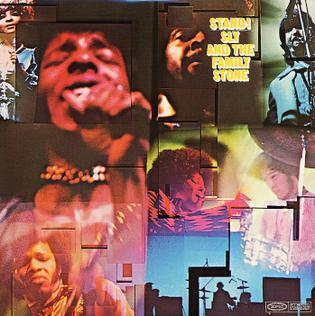
Stand! is the fourth album by soul/funk band Sly and the Family Stone, released in April 1969. Written and produced by lead singer and multi-instrumentalist Sly Stone, Stand! is considered an artistic high-point of the band's career. Released by Epic Records, just before the group's celebrated performance at the Woodstock festival, it became the band's most commercially successful album to date. It includes several well-known songs, among them hit singles, such as "Sing a Simple Song", "I Want to Take You Higher", "Stand!", and "Everyday People". The album was reissued in 1990 on compact disc and vinyl, and again in 2007 as a remastered numbered edition digipack CD with bonus tracks and, in the UK, as only a CD with bonus tracks.

Greg Errico is an American musician and record producer, best known as the drummer for the popular and influential psychedelic soul/funk band Sly and the Family Stone.
"Sing a Simple Song" is a 1968 song by the soul/funk band Sly and the Family Stone, the B-side to their #1 hit "Everyday People". The song is sung in turn by Sly Stone, Freddie Stone, Rose Stone, and Larry Graham, with shouted spoken word sections by Cynthia Robinson. As with nearly all of Sly and the Family Stone's songs, Sylvester "Sly Stone" Stewart was credited as the sole songwriter.

"Everybody Is a Star", released in December 1969, is song written by Sylvester Stewart and recorded by Sly and the Family Stone. The song, released as the B-side to the band's 1970 single "Thank You ", reached number one on the Billboard Hot 100 in February 1970 at a time when chart position for both sides of the single were measured equally and not independently. "Star" was intended to be included on an in-progress album with "Thank You" and "Hot Fun in the Summertime"; the LP was never completed, and the three tracks were instead included on the band's 1970 Greatest Hits compilation. The single was the final classic-era Family Stone recording; it would be 23 months until the next release, the single "Family Affair" in late 1971.

George Allen "Buddy" Miles Jr. was an American composer, drummer, guitarist, vocalist and producer. He was a founding member of the Electric Flag (1967), a member of Jimi Hendrix's Band of Gypsys (1969–1970), founder and leader of the Buddy Miles Express and later, the Buddy Miles Band. Miles also played and recorded with Carlos Santana and others. He also sang lead vocals on the California Raisins claymation TV commercials and recorded two California Raisins R&B albums.

Santana is the third studio album by the American rock band Santana. The band's second self-titled album, it is often referred to as III or Santana III to distinguish it from the band's 1969 debut album. The album was also known as Man with an Outstretched Hand, after its album cover image. It was the third and last album by the Woodstock-era lineup, until their reunion on Santana IV in 2016. It was also considered by many to be the band's peak commercially and musically, as subsequent releases aimed towards more experimental jazz fusion and Latin music. The album also marked the addition of 16-year-old guitarist Neal Schon to the group.
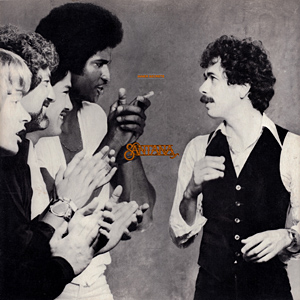
Inner Secrets is the tenth studio album by Santana. It was released in 1978 and, unlike the fusion of Latin, jazz, rock, and spirituality that characterized previous records, it was considered a rock album.

Shinin' On is the eighth studio album by American rock band Grand Funk Railroad. The album was released in March 1974, by Capitol Records. Although not as successful as its predecessor, We're an American Band (1973), it peaked at #5 in the US and was certified gold, and its first single, a cover of "The Loco-Motion" topped the U.S. charts. The original cover was done in bi-visual 3-D and included the required blue and red lensed glasses to view it. A Quadraphonic mix of the album was available in the Quadraphonic 8-Track cartridge format. The title song was featured in The Simpsons' 7th season episode "Homerpalooza" on May 19, 1996.
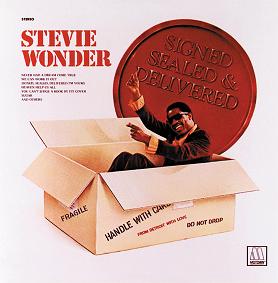
Signed, Sealed & Delivered is the 12th studio album by American recording artist Stevie Wonder, released on August 7, 1970, by Tamla Records. The album featured four hits that hit the Billboard Hot 100: "Signed, Sealed, Delivered I'm Yours", "Heaven Help Us All", "Never Had a Dream Come True" and Wonder's cover of The Beatles' "We Can Work It Out". The album hit No. 25 on the Billboard Pop Albums chart as well as No. 7 on the R&B Albums chart.

Frampton's Camel is the second studio album by English musician and songwriter Peter Frampton, recorded and released in 1973. It was the first album that Frampton recorded in the United States. Most of the album was written in New York City. It reached #110 on the US Billboard 200 Album Chart.
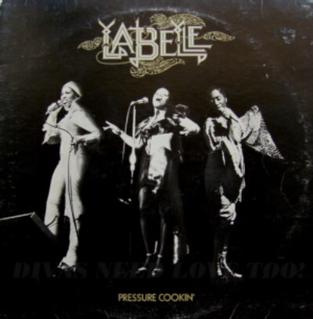
Pressure Cookin' is the third album by American singing trio Labelle, released in August 1973. This release was their first and only for RCA Records, and was critically raved due to the songs that songwriter and member Nona Hendryx composed. The album is also notable for being the first album released following lead singer Patti LaBelle giving birth to her only child, son Zuri Edwards.

Peter Roy Sears is an English rock musician. In a career spanning more than six decades, he has been a member of many bands and has moved through a variety of musical genres, from early R&B, psychedelic improvisational rock of the 1960s, folk, country music, arena rock in the 1970s, and blues. He usually plays bass, keyboards, or both in bands.

Etta Is Betta Than Evvah! is the twelfth studio album by Etta James, released in 1976. It was her final studio album for Chess Records.
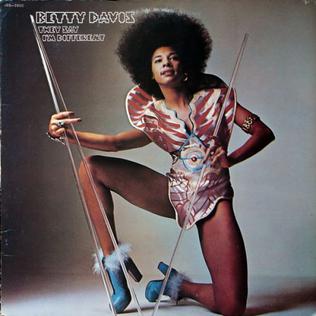
They Say I'm Different is the second studio album by Betty Davis. It was released in 1974.

Connections & Disconnections is an album recorded by Fuzzy Haskins, Calvin Simon, and Grady Thomas under the name Funkadelic.


















